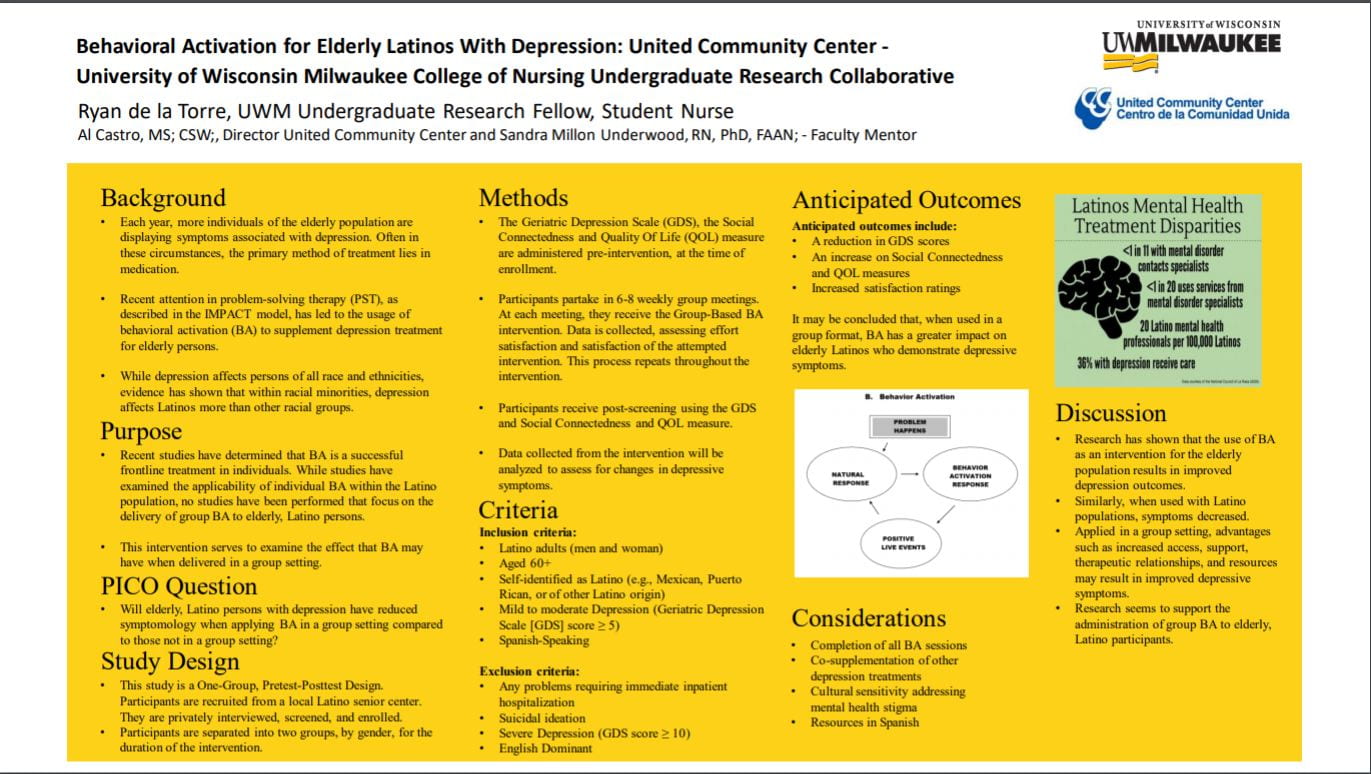Ryan de la Torre, “Behavioral Activation for Elderly Latinos with Depression: UCC-UWM Collaborative”
Mentor: Sandra Millon-Underwood, Nursing
The purpose of this study is to provide Behavioral-Cognitive coaching to elderly Latinos, who exhibit the signs and symptoms of Depression, and determine the effectiveness of Group-Based Behavioral Activation (BA) on depressive symptoms, when used with this population. Latinos face significant social, environmental, economic, and cultural challenges that increases their risk for depression and depressive symptoms. Research suggests that the prevalence of depression in elderly Latinos is high, with as much as double the rates of depression compared to their White or Black counterparts. The rates of depressive symptoms are higher in elderly Latinos, than in younger Latinos.There is a significant need to address the disparities associated with the rates of depression and depressive symptoms for elderly Latinos. Research suggests that Behavioral-Cognitive interventions for depression, which include BA, may be impactful in reducing depression symptoms in elderly Latinos, when used in a group format.This study is a One-Group, Pretest-Posttest Design. Participants are recruited from a local Latino senior center. Participants are privately interviewed, screened, and enrolled. The Geriatric Depression Scale (GDS) and the Social Connectedness and QOL measure are administered during the interview and screening. To be considered for enrollment, potential participants are to register a GDS score 5-10. Participants partake in 6-8 weekly group meetings. At each meeting, they receive the Group-Based BA intervention. Data is collected, assessing effort satisfaction and satisfaction of the attempted intervention. This repeats throughout the course of intervention. Participants receive Post-Screening using the GDS and Social Connectedness and QOL measure. Data collected from intervention will be analyzed quantitatively and qualitatively. Expected outcomes include a reduction in GDS scores, an increase on Social Connectedness and QOL measures, and increased satisfaction ratings. It may be concluded that, when used in a group format, BA has an impact on elderly Latinos who demonstrate depressive symptoms.
Click the thumbnail below to open the full sized poster in a new tab.

This is a fascinating, and seemingly, an important study in the mental health treatment for elderly Latinos. The research methodology is strong with clear guidelines and procedures. The layout is relatively straightforward and easy to follow, though there are moments when the information presented raises questions that would be clarified if in-person questions were possible, but are left unanswered on this poster – for example, why were the participants divided by gender? There also seems to be a lack of conclusions, which isn’t addressed. Was the research not completed? This, of course, would have been understandable, but should probably be noted since there was not the opportunity to discuss the research in person. But, overall, a very good job and an intriguing study.